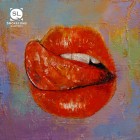You have a poetry collection coming out this year. Tell us about that.
I do and I’m really excited! It’s called Sexting the Dead, and it’s a collaborative collection with a remarkable poet, Joanna Valente, whose work I am honored to share the page with. It’s my first book and it wasn’t anything I’d planned. I primarily see myself as a prose writer—my MFA is in fiction—but I’m a slow writer and I’d been going through a painful period of writer’s block last year. I turned to poetry as a way to escape the pressures I put on myself with fiction, and I suddenly started publishing a bunch. Bud Smith, the publisher of an indie press that I’m fond of called Unknown Press, approached me in the fall about publishing a full collection of my poetry, and then we decided on the collaboration idea with Joanna, and it all flourished from there. It will be released in November. Electric Literature recently listed the collection in their “Great 2017 Indie Press Preview,” so I’m thrilled. I can’t wait to actually hold it in my hands.
After the blind selection of “Night Run,” I wasn’t surprised at all to learn in your bio that you were a poet. “Night Run” was traditional flash prose, for sure, but I sensed a writer in control of word selection and rhythm. How rigid or flexible is the divide between the two forms for you? Are they always all there helping each other, in some sense?
The two forms are merging more and more as of late. I’ve always loved fiction on the sentence and word level; there is no feeling quite like the high I get from reading a rhythmically flawless sentence, and the writers I admire the most are those whose prose seems to perfectly balance lyricism with precision and directness (for example, Junot Díaz, Mary Gaitskill, Amy Hempel, Denis Johnson). But as I’ve been writing more poetry, I find I’m now focusing in on word selection and rhythm in my fiction from the start of it, as opposed to larger things like character or plot or themes. Those now flow out from the sentences. If I can get the voice and tone right, which is done at the sentence level, then the rest of the story seems to emerge and surprise me. And it’s been freeing. I’m less rigid with my fiction now, or my idea of what I think a new story should be, and it’s helped me get over the writer’s block. My poetry is also often written in a prose format, so the lines between the two are blurring more and more now. Writing fiction is more pleasurable for me these days because of writing poetry.
I’m interested in where we get ideas for our work, particularly for flash. Where did “Night Run” come from and how different is the completed piece from where it started?
I’ve been fixated on the question of where we get ideas for our work for a long time. It’s often the initial question I ask other writers because for years I’ve been terrified of first drafts and I’ve hated approaching the page without having it all, or most of it all, already figured out. This fear resulted in me writing a lot of stories that felt lifeless and then it lead to me not being able to write new fiction at all. Night Run was a big breakthrough. I wrote it in one sitting, but I wrote it with a focus on voice, and so it sort of flowed out without much thought into what it was about. I’d been going through a rough period, health wise, and was on a medical leave from work, and most nights, I was having a lot of trouble sleeping. I found myself making late night runs to the small 24-hour market in my neighborhood just to get out of my apartment. One night, after I was walking back from a two am trip, a few specific lines from the story popped into my head, and when I got home, I decided to play with them. An hour or so later, the story was completed and very little changed from that first draft to the final one.
One of the things that drew me to the narrator of “Night Run” is how up front she is. Almost like a confession, being honest seems important to her, but as the piece goes on, it seems kind of fluid. Maybe she’s actually hiding as much from us as she is revealing. Seems like you’ve found a gold mine for flash—what secrets people will reveal and what they keep. What does someone who is willing to reveal their shit-examining patterns decide can’t be revealed? On the flip side, with someone who normally won’t reveal anything, what is so strong they have to let out? Are these common themes for you, or was that unique to this story’s particular visit to the bodega?
I’m fascinated by seemingly honest, up-front characters who are often very in tune with and unapologetic about their thoughts and feelings, but upon a deeper look, are either somewhat calculating with what they reveal, or even reveal things about themselves they don’t know they are revealing by what they have not revealed. I’m interested in how we attempt to control our images and narratives by lying to ourselves or to others through what we expose, highlight, or focus on versus what we hide from, deny, or leave out. Honesty, both to the self and to those we have relationships with, and the ways we often craft it, is a very common theme for me. I’m drawn to characters who think they are forthright but often have significant blind spots that are only apparent to the reader.
What’s the strangest thing a complete stranger has ever revealed to you in public, maybe at a bodega or in line at an ATM?
NYC has been home for ten years now, so not much seems strange to hear anymore! However, out of nowhere the other night, a stranger told me that since they were five, they’ve suspected their uncle staged the car accident that killed one of their cousins; they’re certain the uncle actually committed murder, but has gotten away with it for thirty-plus years. I thought that was a bit random and weird to divulge to someone you don’t know.
What’s the next project?
My mentor has been pushing me more and more these days to dive into nonfiction. I’m finally listening and starting to work on a book about chronic illness. I’ve been diagnosed with two since I was a kid, and living with sickness has always deeply informed my fiction and poetry. Fingers crossed that I can write honestly, interestingly, and ultimately meaningfully about my experience, and along the way, I’m planning to devote significant time to writing more flash. It’s definitely my new love after writing “Night Run”!



 The SmokeLong Grand Micro Contest (The Mikey) is now an annual competition celebrating and compensating the best micro fiction and nonfiction online.
The SmokeLong Grand Micro Contest (The Mikey) is now an annual competition celebrating and compensating the best micro fiction and nonfiction online.